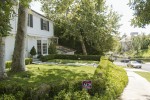Los Angeles does not have any plans to rollback water conservation policies following recent rainfall.
During the drought, the city of Los Angeles and Mayor Eric Garcetti introduced new regulations to conserve water, including limiting water usage for landscaping and irrigation, and adopting more water-efficient plumbing in homes. People who don’t obey the regulations are subject to large fines.
Amanda Parsons, spokesperson for Los Angeles Department of Water and Power, said Los Angeles has no plans to end these water restrictions and conservation plans.
“Just because this year has been so abundant in rainfall does not mean it is guaranteed next year,” she said. “In an area like Los Angeles, water conservation needs to be a way of life.”
Prasons added Garcetti’s executive action, issued in October 2014, is still in effect. The executive action outlines plans to reduce potable water usage by 20 percent by 2017 and imported potable water by 50 percent by 2024.
Penalties and fees for overusage of water are also still in effect, she said.
However, Governor Jerry Brown lifted the drought emergency. About 8 percent of California is in moderate drought as of April 2017, with no part of California being in severe drought, according to the U.S. Drought Monitor.
Mark Gold, UCLA associate vice chancellor for environment and sustainability, said he thinks California is not ready to declare itself drought free.
Gold said he thinks current water conservation policies, such as asking agencies to report water usage and not watering street plants, should be mandated even when California is not in a declared drought.
Gold also said Los Angeles has been using water beyond its means.
“The drought was successful in getting us to live within our means, but there’s still a lot of work to do,” he said.
Gold added Los Angeles recently had the driest period in a century, which was followed by the wettest period in a century.
“The lesson we’ve learned is that the climate can be far more variable than we ever thought,” he said. “Planning for our water supply future and flood control based on looking backwards is not going to be protective or adequate for California.”
Gold said flood and supply control in Los Angeles and California were not equipped to handle the heavy rains. As a result, hundreds of thousands of acre-feet of water were not captured.
“We can’t say we’re out of a drought when we have overdrafted our groundwater basin so severely,” he said. “Until we sustainably manage our groundwater, the drought is one dry season away.”
Gold said he thinks people are starting to understand water conservation better, and UCLA’s newer facilities, such as the Renee and Meyer Luskin Conference Center, show improvement on energy and water conserving equipment.
UCLA Chief Sustainability Officer Nurit Katz, said the campus is following LADWP regulations but has no plans to reduce or halt water conservation efforts.
Katz said UCLA ran a water conservation challenge on the Hill that saved 20 million gallons of water, and had landscaping projects that added drought-resistant plants and changed grass into turf.
Katz added that UCLA does not feel Los Angeles is safe from a drought yet.
“The drought emergency was declared over, but that’s just the technical state,” she said. “LA is at a high risk for a 35-year megadrought, so water continues to be a significant challenge.”
Sandy Brown, president of the Holmby Westwood Property Owners Association, said she believes water conservation efforts in Westwood will continue.
Brown said she thinks homeowners are unlikely to scale back their water conservation efforts after the drought emergency was lifted.
“We have done education in the neighborhood on what might work for us for drought resistance,” she said. “We have gotten information from UCLA because if it works there it will work here – we’re neighbors.”
Although she said she believes existing Westwood residents will continue to conserve water, Brown thinks incoming homeowners and residents will cooperate with water conservation as well.
“It’s normal to conserve water now,” Brown said.
Los Angeles will continue to mandate water conservation laws until further notice.
